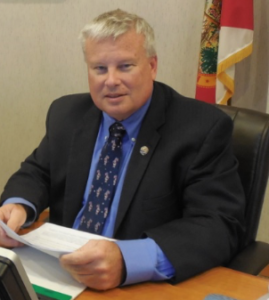By Dale Martin
City Manager
Fernandina Beach
December 3, 2021
” . . . we will have to find ways to work together instead of demonizing our fellow citizens from both sides.”
:

Next Tuesday is December 7, a date of notable interest.
First, it marks the last day of Medicare open enrollment, bringing a merciful end to the exhaustive television and radio spots promoting insurance providers. Unfortunately, with the turn of the calendar to shortly follow to 2022, an election year, the barrage of political campaign ads will begin (but likely without William Shatner).
Second, December 7 is my mother’s birthday. Happy birthday, Mom.
Third, and most significantly (globally, that is; don’t tell my mother), it marks the eightieth anniversary of the Japanese attack on Pearl Harbor, formally drawing the United States into World War II.
While Europe, Asia, and Africa had been engulfed in war for years prior to December 1941, the United States had been unscathed by war. The U.S. “official” involvement during those early war years was limited to providing support to what would eventually become other allied nations: primarily Britain, the Soviet Union, and China. Following the Japanese attack, however, the U.S. became fully active in the war.
The attack on Pearl Harbor killed nearly 2,500 people, both military personnel and civilians. The U.S. Navy’s Pacific Fleet’s battleships were crippled, but several aircraft carriers, which were emerging as the new dominant warship (as demonstrated by the Japanese attack itself), were not at Pearl Harbor. While the attack was a short-term strategic success for Japan, limiting American ability to counteract Japanese aggression elsewhere in the Pacific region, the stunning attack galvanized the U.S. to fully mobilize and respond to Axis (Japan, Germany, and Italy) aggression around the world. The U.S. was committed to fighting for the unconditional surrender of the enemy nations and not satisfied with settling for peace as perhaps the Japanese leaders had hoped. To learn more of the preparation and attack on Pearl Harbor, I recommend the 1970 movie, “Tora, Tora, Tora.”
As mentioned, the attack on Pearl Harbor was a nationally galvanizing event to Americans. Citizens were unified in fighting the Japanese, German, and Italian enemies. It was, at the time, a moral crusade of good versus evil. It spawned what has come to be known as The Greatest Generation, a term popularized by Tom Brokaw in a book of the same name.
The members of that generation grew up during the Great Depression of the 1930s and matured on the war and home fronts in the 1940s. Through their experience and efforts, they led an uninterested isolationist nation to become a globally dominant economic and military power for the rest of the twentieth century.
As the Greatest Generation passes, so, too, perhaps, are the experiences and efforts of their challenges. It will be interesting to read and hear the headlines and stories on Tuesday morning. How many will cite the Pearl Harbor anniversary? Will it be a prominent story, a mere mention, or buried beneath the hottest celebrity scandal of the day? Will American take time to pause and reflect on the concept of “unity,” something that surged eighty years ago and carried this nation through four years of global war?
Does this nation have the, let’s say backbone, to rise to meet new global challenges? Military technology has reduced the need for the massive amounts of materiel required to win World War II: the number of troops, ships, and planes that comprised the U.S. military today is a mere fraction of the mid-twentieth century force which secured global peace.
Does this nation not only have the capabilities to defend and secure freedom and liberty, but also the commitment to those ideals? The world of today is not necessarily as black and white as was the world in 1940, but it isn’t all grey, either. What will be this nation’s role to counter new aggressions in Europe, Asia, and the Pacific, because, like it or not, it is only this nation that can effectively counter such aggression.
December 7, 1941, and the following four years changed the twentieth century trajectory of lives and nations. What will be our twenty-first century path? We have differences, of course, and in many ways, that is perhaps a great strength, but we will have to find ways to work together instead of demonizing our fellow citizens from both sides.
I wish us well.

“We have differences, of course, and in many ways, that is perhaps a great strength, but we will have to find ways to work together instead of demonizing our fellow citizens from both sides”.
If we would have had cell phones and Facebook in 1941 we probably would have lost the war. Digital platforms will make the unification of the “Greatest Generation” an impossible goal going forward. The self absorption today’s world has created is off the charts. We can’t even get that person sitting #1 for the green arrow at Sadler to pull their head up long enough to allow others though the intersection except themselves after horns are blared behind them.
To Mr. Martin’s points in this piece – we would all do well to study the life and legacy of Senator Bob Dole. As one of the last members of the Greatest Generation, he left us with much to consider. Start with “One Soldier’s Story” as a gift to yourself this Christmas.